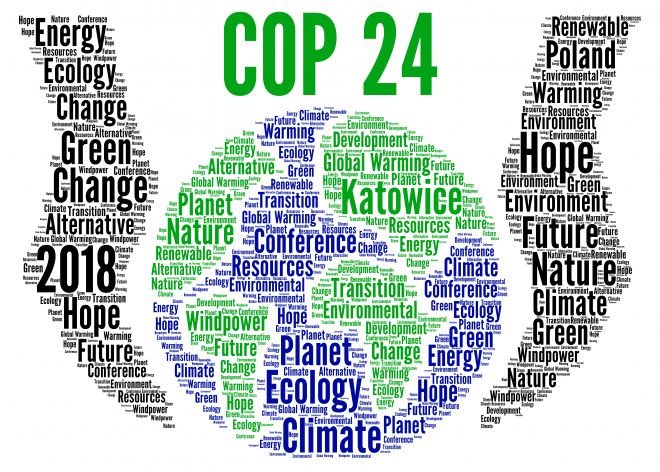COP24: A Sluggish but Persistent Response
Published on February, 22 2019
By Odile Hugonot Haber
“Climate science demands that we must act now to stop the acceleration of climate change. To keep warming below 1.5 degrees C, we must keep the majority of fossil fuel under the ground and freeze fossil fuel projects as we develop a quick transition to 100% renewable energies.”
—from 350.org
Between December 2nd and December 15th, the 2018 Conference of Parties (COP 24), was held in Katowice, Poland, where 196 countries were able to create together “the Katowice rulebook” to begin applying the agreements made in Paris in 2015.
Unfortunately, most nations were slow in meeting the agreements made three years earlier and their efforts did not rise to meet the urgency that the time demands given climate-related catastrophes that are multiplying in the world. Environmental leaders were disappointed and dismayed that the COP24 meeting reflected a lack of ambition.
In a press release entitled COP24 Ends Without Firm Promises to Raise Climate Action and Ambition, Greenpeace International Executive Director Jennifer Morgan said:
“A year of climate disasters and a dire warning from the world’s top scientists should have led to so much more. Instead, governments let people down again as they ignored the science and the plight of the vulnerable. Recognizing the urgency of raised ambition and adopting a set of rules for climate action is not nearly enough when whole nations face extinction. Without immediate action, even the strongest rules will not get us anywhere. People expected action and that is what governments did not deliver. This is morally unacceptable and they must now carry with them the outrage of people and come to the UN Secretary General’s summit in 2019 with higher climate action targets.”
Why has progress been so sluggish? The pull from Europe, specifically Germany and France, was no longer strong, the leadership of the COP24 in Poland was weak, the US was absent, and Brazil was blocking market agreements for the exchange of CO2 for the next COP (to be held in Chile in November 2019).
There was also a failure to act with regard to poorer nations, since the reference to human rights was taken out of the text of the “rulebook.” The voice of the victims in these parts of the world was barely heard at the meeting. This is in spite of the fact that many islands still lay in ruins such as the Island of Dominica.
A report was given by the Intergovernmental Panel on Climate Change (IPCC) which contained scientific and technological advice entitled: “Unpacking the new scientific knowledge and key finding in the IPCC Special report on global warming of 1.5 C.”
According to the IPCC at COP24, “This report is the key scientific input into COP24, when Parties to the United Nations Framework Convention on Climate Change (UNFCCC) will review the goals and progress of the Paris Agreement in a process called the Talanoa Dialogue.” "Talanoa” is a traditional word used in Fiji and across the Pacific to reflect a process of inclusive, participatory, and transparent dialogue, which can serve also as a measuring device.
Despite the urgency called for in this report, unfortunately it did not elicit an adequate response in light of the growing disasters such as droughts, flood, extreme heat, and the ensuing poverty that results from these events. Millions of people are already feeling these effects, and it seems that rich nations could have moved into climate actions and help the developing world and poorer nations as they first proposed in Paris.
In a press release issued by LDC Climate Change, Gebru Jember Endalew said, “It is a question of justice and survival.” As Chair of the Least Developed Countries Group, Endalew advocated for a group of 47 countries and little islands that represent one billion human beings without the weight and power of the four petrol-leading strong nations (the US, Russia, Saudi Arabia, and Kuwait). These nations wanted to kill the agenda rather than promote it actively. They do not seem to comprehend that the reality of climate change is becoming more evident every year and is not slowing.
What the COP24 did accomplish is to provide a space in which the civil society and the nongovernmental organizations (NGOs) could gather and take power back. Even if large nations are resistant, changes are happening all over the world due to grassroots actions and in local communities where solutions are evolving to solve climate-related problems. People can and are finding their power and holding their governments accountable.
350.org tells us that diverse movements fighting for justice all over the world are growing rapidly in strength and in numbers. On New Year’s Day, 5 million women came out to form a women’s wall across Kerala in South India. On January 8, a movement for national and global solidarity with Indigenous people in Canada included 67 actions around the world. In Uganda, Germany, Switzerland, and Belgium there were school strikes for climate changes. People seem to understand faster than nations the seriousness of the challenges.
Greta Thuberg, a 15 year-old activist, addressed the COP24 Assembly: “Today we use 100 million barrels of oil every day. There are no politics to change that. There are no rules to keep that oil in the ground, so we can’t save the world by playing by the rules because the rules have to change. Everything needs to change and it has to start today,” declared the Swedish teenager.
Climate change is happening, but we in WILPF must work so the climate justice movement will gain speed. Keeping to the targets will require rapid, far reaching, unprecedented changes in all aspects of society. “Climate science is not political football” said Camilla Born from climate think tank E3G (read Matt McGrath's BBC News article which this quote comes from). Indeed, it is the sacred duty of all people who want life on earth to flourish.



